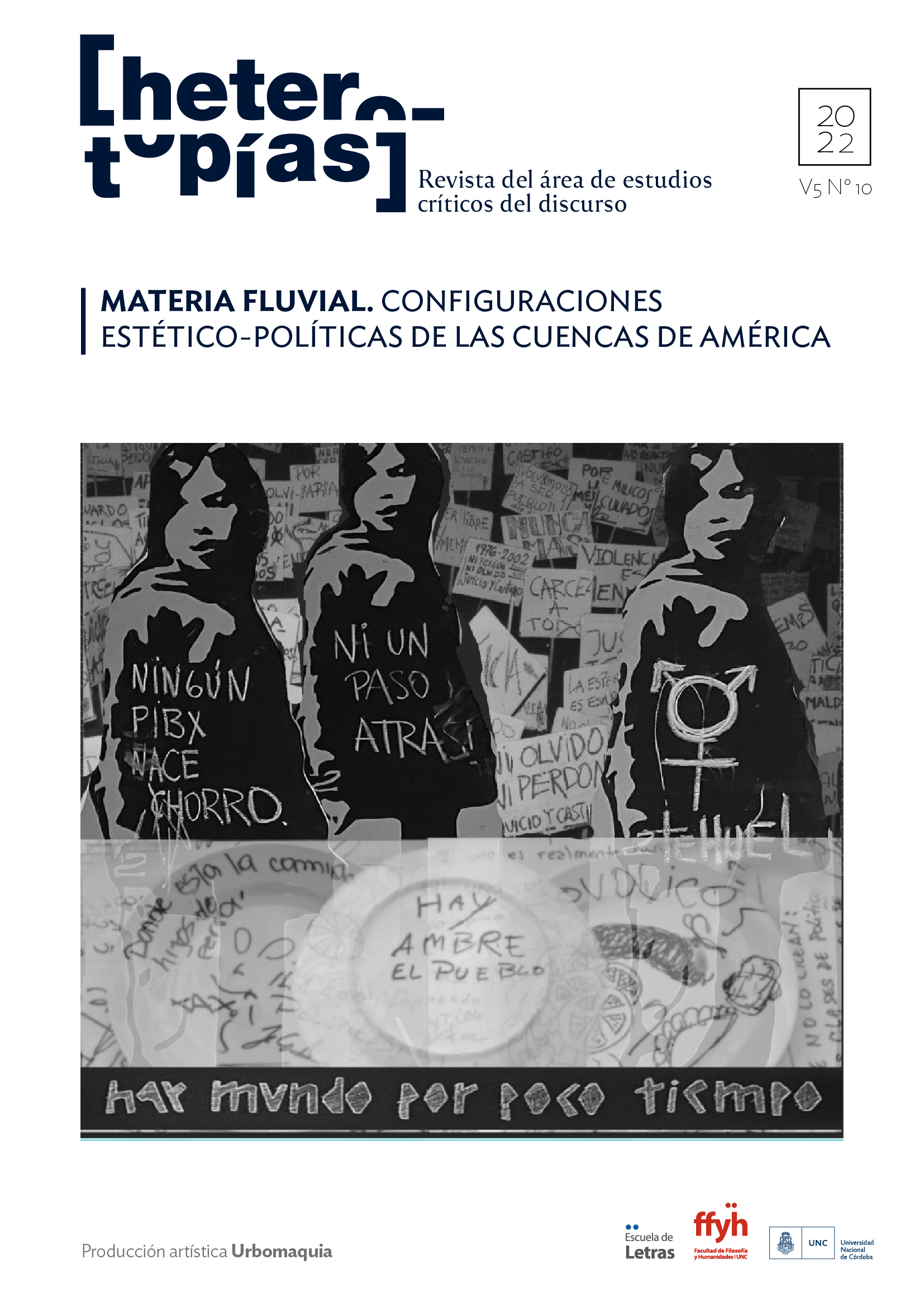Live like a river. Civilization and schismogenesis
Main Article Content
Abstract
This paper seeks to explore collective ways to dissolve what I call hydrological States, that is, the dominant forms of governance of watersheds configured according to the keys of industrial modernism and its extractivist policies. The challenge is to imagine transnational civilizational options to design ecological States without generating violent reactions. To this end, this paper studies two singular cases: the collapse of the Elwha River hydroelectric dam under the leadership of the Klallam tribe, in the USA, and the actions carried out by the transnational network Humedales sin fronteras in the South America. In both, the political relevance of identification with other non-humans is highlighted, as well as the increasingly important role of indigenous thinking.
Downloads
Article Details

This work is licensed under a Creative Commons Attribution-NonCommercial-ShareAlike 4.0 International License.
Those authors who have publications with this journal, accept the following terms: Those authors who have publications with this journal, accept the following terms:
a. The authors will keep their copyright and guarantee to the journal the right of first publication of their work, which will be simultaneously subject to the Creative Commons Attribution - Non-Commercial - Share Alike (by-nc-sa) Attribution License; no commercial use of the original work or any derivative works is allowed, the distribution of which must be done with a license equal to the one that regulates the original work.
b. Authors may adopt other non-exclusive license agreements for the distribution of the published version of the work (e.g., deposit it in an institutional telematic archive or publish it in a monographic volume) provided that the initial publication in this journal is indicated.
c. Authors are allowed and recommended to disseminate their work through the Internet (e.g. in institutional telematic archives or on their website) before and during the submission process, which may lead to interesting exchanges and increase the number of citations of the published work. (See The effect of open access).
How to Cite
References
Aldwell, Th. (1950). Conquering the Last Frontier. Seattle, EE. UU.: Artcraft Engraving and Electrotype Company.
American Friends Service Committee (eds.) (1970). Uncommon Controversy: Fishing Rights of the Muckleshoot, Puyallup, and Nisqually Indians. Washington, EE. UU.: University of Washington Press.
Bateson, G. (1998). Pasos hacia una ecología de la mente. Buenos Aires, Argentina: Lohlé-Lumen.
Berg, P. y Dasmann, R. (1977). Reinhabiting California. En The Ecologist 7/10.
Brewitt, P. (2019). Same River Twice. Oregon, EE. UU.: Oregon State University Press.
Casa Río/Humedales sin Fronteras, Corredores, mapa online. Recuperado de: https://map.casariolab.art.
Clastres, P. (1978). La sociedad contra el Estado. Caracas, Venezuela: Monte Ávila.
Deleuze, G. y Guattari, F. (2002). Mil mesetas. Capitalismo y esquizofrenia. Valencia, España: Pre-Textos.
Guarino, J. (2013). Tribal Advocacy and the Art of Dam Removal: The Lower Elwha Klallam and the Elwha Dams. En American Indian Law Journal 2/1.
Graeber, D. y Wengrow, D. (2021). The Dawn of Everything: A New History of Humanity. Nueva York, EE. UU.: Straus and Giroux. [Existe trad. cast. reciente: (2022). El amanecer de todo. Una nueva historia de la humanidad. Barcelona, España: Ariel.]
Holmes, B. (2020). Check My Pulse: The Anthropocene River in Reverse. En Anthropocene Curriculum. Recuperado de: https://www.anthropocene-curriculum.org/contribution/check-my-pulse.
Kanai, J. M. (2016). The pervasiveness of neoliberal territorial design: Cross-border infrastructure planning in South America since the introduction of IIRSA. En Geoforum 69.
Lema, V. (2013). Crianza mutua: una gramática de la sociabilidad andina. Actas de la X Reunión de Antropología del Mercosur, publicación en CD-Rom. Córdoba, Argentina: Universidad Nacional de Córdoba. Recuperado de:
https://www.academia.edu/5552668/Crianza_mutua_una_gram%C3%Altica_de_la_sociabilidad_ andina.
Leslie, J. (2019). On the Northwest’s Snake River, the Case for Dam Removal Grows. En YaleEnvironment360 (10 de octubre). Recuperado de: https://e360.yale.edu/features/on-the-northwests-snake-river-the-case-for-dam-removal-grows.
Maçães, B. (2018). The Dawn of Eurasia: On the Trail of a New World Order. Yale, EE. UU.: Yale University Press.
McCloskey, D. (1988). Cascadia: a great Green land on the northeast Pacific Rim. Seattle, EE. UU.: Cascadia Institute.
McCloskey, D. (1994). Cascadia. En Aberly, D. (ed.). Futures by Design: The Practice of Ecological Planning. Gabriola Island, B.C. y Filadelfia, EE. UU.: New Society Publishers.
Nye, D. E. (1994). American Technological Sublime. Boston, EE. UU.: MIT Press.
Nobre, A. D. (2014). The Future Climate of Amazonia: Scientific Assessment Report. Sao Jose dos Campos –SP Edition, ARA, CCST-INPE/INPA. Recuperado de: http://www.ccst.inpe.br/wp-content/uploads/2014/11/The_Future_Climate_of_Amazonia_Report.pdf.
Ott, B. (1987). Indian Fishing Rights in the Pacific Northwest: The Need for Federal Intervention. En Boston College Environmental Law Review 14/2.
Perea Borda, J. (1998). Los ríos nos unen: Integración fluvial suramericana. Bogotá, Colombia: Corporación Andina de Fomento.
Wolf, E. y Zuckerman, S. (eds.) (2003). Salmon Nation: People, Fish, and our Common Home. Portland, EE. UU.: Ecotrust.
Zibechi, R. (2006). IIRSA: la integración a la medida de los mercados. Programa de las Américas Informe Especial (13 de junio). Recuperado de: https://www.alternative-regionalisms.org/wp-content-/uploads/2009/07/zibechi-iirsa.pdf.
